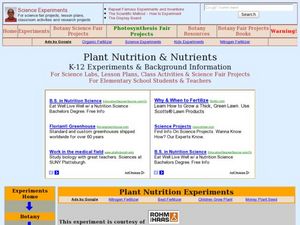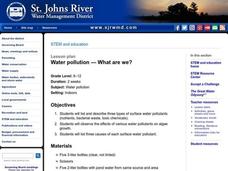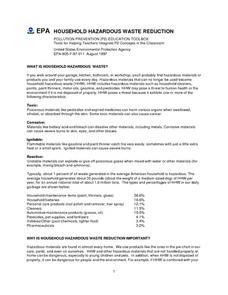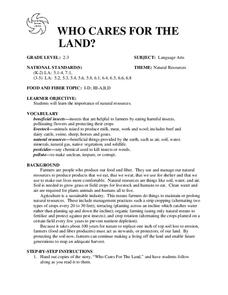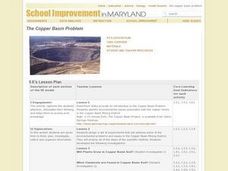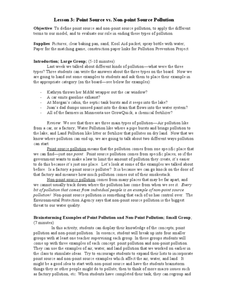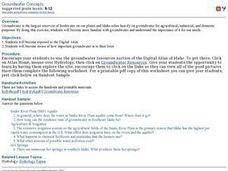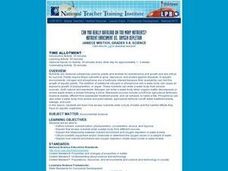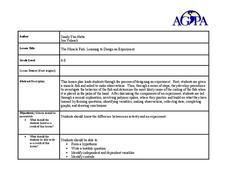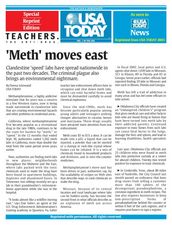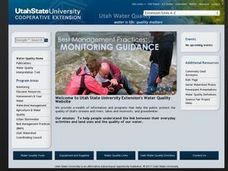Curated OER
Plant Nutrition and Nutrients
Learners observe seeds growth and examine the different parts of the seedling. In this biology lesson, students compare the growth of seeds planted in soil and in hydroponics. They record their observations in their science journal and...
Curated OER
Salt Marsh in a Pan
Students create a model of a salt marsh to discover the impact of pollution and human activities on water-based habitats including bays and the ocean. They recognize the relationship between natural and developed areas. Students impact...
Curated OER
Compost in a Bag!
Fourth graders experiment to see which objects decompose. In this compost lesson, 4th graders observe the changes of labeled objects in a bag. Leave the objects for one month and record the changes by observation and weight. Students...
Curated OER
What Are We?
Students list and describe three types of surface water pollutants. They observe the effects of various water pollutants on algae growth. Three causes of each surface water pollutant is listed.
Curated OER
Household Hazardous Waste Reduction
Students discover the different types of hazardous waste. They examine ways to dispose of the hazardous materials safely and without harming the environment.
Curated OER
Waste: Where Does It Come From? Where Does It Go?
Learners work together to identify sources of hazardous waste in their community. They discover the threat it poses to the environment. They examine how to properly dispose of hazardous waste as well.
Curated OER
TE Lesson: How Clean is that Water?
Students examine the factors the affect water quality, and allow for animals and plants to live. They look at how engineers apply water quality information when making stream modifications in order to ensure drinking water quality. They...
Curated OER
WHO CARES FOR THE LAND?
Students explore the importance of natural resources. They are given copies of the story, "Who Cares For The Land," and students follow
along as the teacher reads it. Students identify the key points in the story. (Soil, water and air...
Curated OER
Space Age Technology Comes to Earth
Students explore eight career and technical areas and make connections with business, family and consumers, and technology. They examine and describe how agriculture and natural resources impact our quality of life. They explore and...
Curated OER
The Copper Basin Problem
Learners view a video about how human actions impact the environment. They design a set of experiments to address some of the problems and issues raised by the video.
Curated OER
Phytoplankton and Ocean Color
Fifth graders identify function of phytoplankton in the biospere by conducting experiments and simulations and reading for information. They detect the presence of phytoplankton in bodies of water by examining ocean in satellite images...
Curated OER
Point Source vs. Non-point Source Pollution
Students define and differentiate between point source and non-point source pollution. Students discuss various types of pollution including air, water and land pollution, analyze demonstrations and complete a worksheet.
Curated OER
Korea in Your Community
Students identify Korean products sold in the US and become aware of Korea's importance in international trade.
Curated OER
Groundwater Concepts
Young scholars use a digital atlas and other electronic resources to explore freshwater reservoirs in Idaho. They discover the importance of groundwater and discuss the agricultural, industrial and domestic uses of underground...
Curated OER
Ocean Pollution
Students study their role in eliminating ocean pollution and helping keep the oceans clean. In this environmental issues lesson plan, students define pollution and brainstorm examples of ocean pollution. Students define biodegradable and...
Curated OER
Nutrient Enrichment vs. Oxygen Depletion
Students investigate how excess nutrients enter a body of water, and the harmful effects they have on aquatic organisms.
Curated OER
Florida's Springs
Students illustrate how water is stored and the water cycle. They discover how underground water can become contaminated.
Curated OER
The Miracle Fish: Learning to Design an Experiment
Young scholars develop procedures to explore the behavior of fish. In this scientific experiment lesson students from a hypothesis, write a question, identify different variables and controls in their experiment.
Curated OER
USA Today Lesson: "Meth" Moves East
Students explore methamphetamine use. In this health journalism instructional activity, students read the USA Today article titled "Meth Moves East", respond to discussion questions regarding the article, and complete an activity based...
Curated OER
Root, Root, Root for the Nutrients
Students observe the growth of a seed, predict what will happen when seeds are planted without soil, and conduct an experiment using a hydroponics system.
Curated OER
Natural Gardening
Students study the effect of pesticides on plants and insects. In this gardening instructional activity, students discuss the importance of insects. They define pesticides, evaluate their effectiveness and the problems they might...
Curated OER
Surface Water Model
Students examine, through demonstration and experimentation, how water moves through watershed, identify pollutants that can enter water system from different land use activities, and discuss ways people can help prevent water pollution.
Curated OER
Using Blood Tests to Identify Babies and Criminals
Students solve a crime by matching a suspect's blood type to physical evidence collected at the crime scene. In this forensic science lesson, students identify the different blood types. They explain how blood tests work.
Curated OER
BIOASSESSMENT OF STREAMS
Students work as a team to gather organisms from a stream to evaluate if the water quality is excellent, good, or fair to poor.
